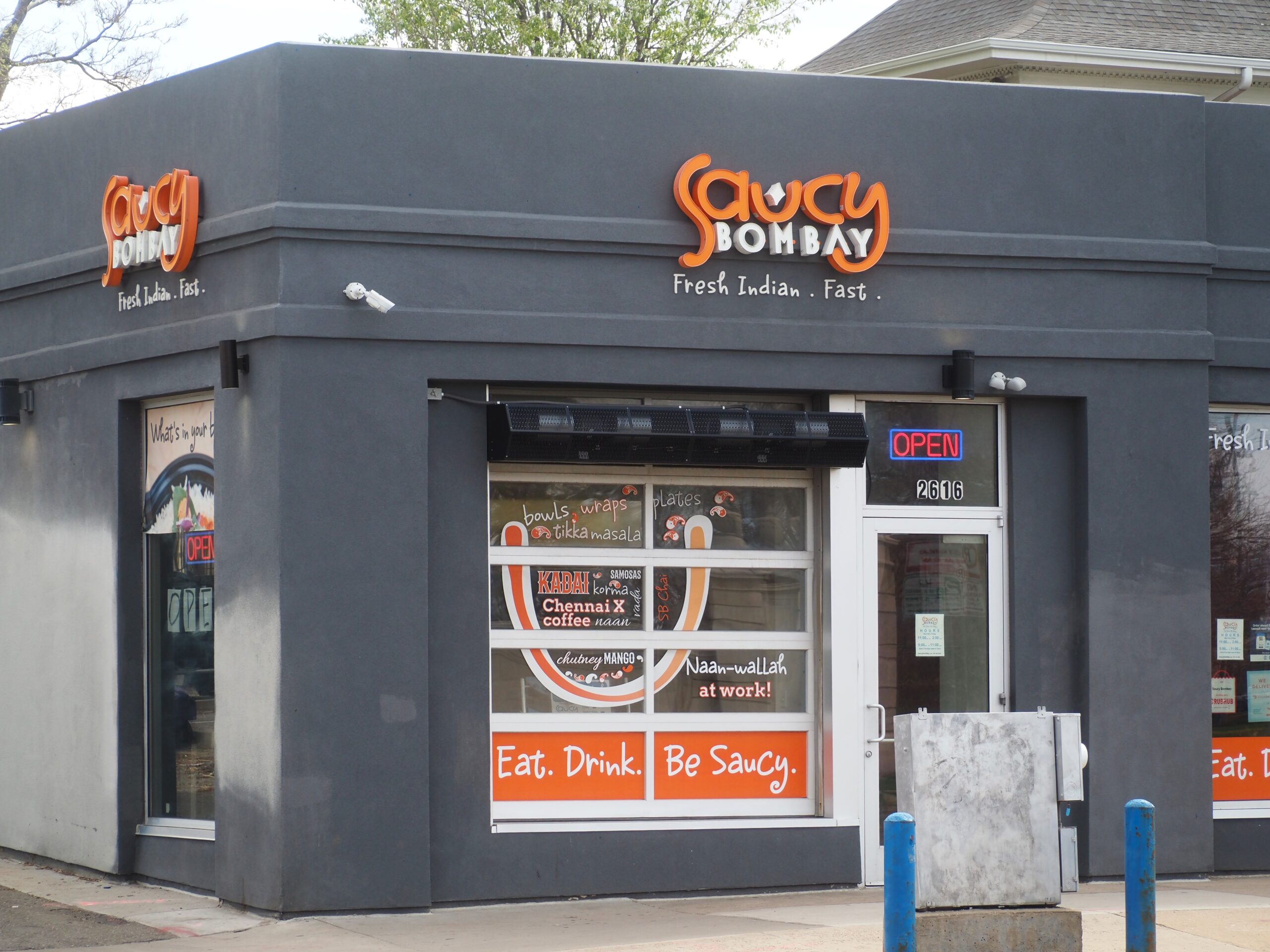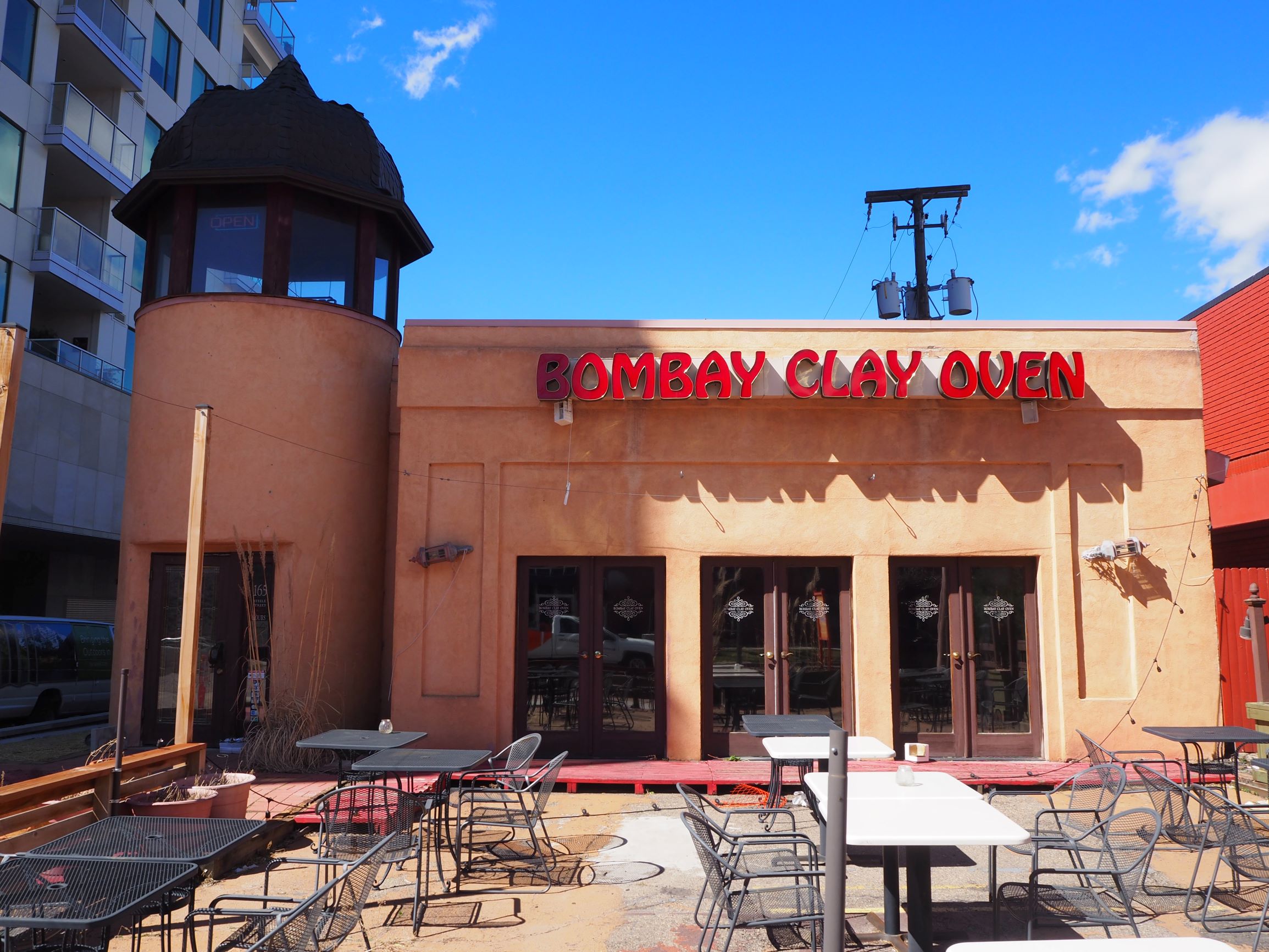
Despite its grand plans for expansion, Saucy Bombay has just one location, at 2616 E. Colfax Ave. in Denver. (Justin Wingerter/BusinessDen)
State regulators say that a local Indian restaurant with one location used “half-truths and lies” to sell investors on its grandiose plans for a nationwide expansion before spending the $380,000 that shareholders invested on rent, operating costs and Ponzi-like payments.
Through a pair of lawsuits it filed April 16, the Colorado Division of Securities is seeking to recover lost investor cash from The Bombay Group and securities broker Michael Bissonnette. Both defendants declined offers to discuss the allegations with BusinessDen.
Bombay Clay Oven opened in Highlands Ranch in the early 1990s before moving to Cherry Creek in 1997, where it occupied 165 Steele St. for 22 years until closing in 2019.
Bombay’s owners, Marshall and Rohini Miranda, also ran a fast-casual offshoot called Saucy Bombay at Republic Plaza downtown in the 2010s, until the food court it was in closed in 2015. It is Saucy Bombay that has drawn the scrutiny of state investigators as of late.
In 2014, while both of their Bombay restaurants were still open, the Mirandas allegedly hired Michael Bissonnette, an investor and marketer in Longmont, to pitch investors on the idea of a Saucy Bombay empire that would begin with 140 franchises in 11 western states before expanding east and possibly come to include thousands of locations, à la Chipotle.
According to last week’s lawsuits, an investment in Saucy Bombay was framed as the best of all worlds: “A safe and conservative investment,” in the words of the Mirandas, that could yield returns as high as 2,900%, with guaranteed dividends of 8% quarterly.
After the sole Saucy Bombay location closed at the end of 2015, Bissonnette and Marshall Miranda did not tell investors and continued talking about the restaurant as if it was open, according to the Division of Securities. As a result, 17 people — 16 Coloradans and one other — invested $380,000 in Saucy Bombay’s parent company, The Bombay Group.
The money trickled into The Bombay Group’s bank account throughout 2015 and 2016. Bank records obtained by investigators allegedly show that it was then used to pay property taxes, operating costs and rent at Bombay Clay Oven. The Bombay Group also paid itself a $34,500 commission for selling its own stock, according to the Division of Securities.
No revenue was deposited into the bank account, only investment capital, the division said.
“Thus, any amounts paid to an investor were not ‘dividends’ of revenues, but a repayment from their own investment or the investments of others,” last week’s lawsuits claim.
By the end of 2016, the bank account was nearly empty and no payments have been sent to investors since. The Mirandas opened a Saucy Bombay across from East High School at 2616 E. Colfax Ave. in 2018; it remains the one and only Saucy Bombay location.
“Of the seventeen investors, none received a dividend, let alone a quarterly dividend,” the lawsuits allege. “The Bombay Group could not pay a dividend because The Bombay Group was not profitable. The plan to franchise Saucy Bombay simply never materialized.”
The Division of Securities is suing Bissonnette, his Bissonnette Consultant Group, The Bombay Group and Marshall Miranda for allegedly violating state securities laws by misleading investors, selling unregistered securities and, in Bissonnette’s case, selling without a license.
Reached by phone last week, Bissonnette said he was unaware of the lawsuit. After a BusinessDen reporter sent him a copy of it, he stopped answering his phone.
Talking with a reporter at Saucy Bombay on Thursday, Marshall Miranda said that he, too, was unaware of the lawsuit, though he knew the Division of Securities had been investigating. Miranda said that he would need to talk with his lawyers before discussing the matter. He did not answer follow-up phone calls seeking comment after that.
“The investors in this case really believed in The Bombay Group and their restaurant Saucy Bombay,” said Tung Chan, the state’s securities commissioner. “But as we allege, the investors were not told the truth about the investments and they have not been paid back. If you have invested with The Bombay Group, please contact the Securities Division right away.”

Despite its grand plans for expansion, Saucy Bombay has just one location, at 2616 E. Colfax Ave. in Denver. (Justin Wingerter/BusinessDen)
State regulators say that a local Indian restaurant with one location used “half-truths and lies” to sell investors on its grandiose plans for a nationwide expansion before spending the $380,000 that shareholders invested on rent, operating costs and Ponzi-like payments.
Through a pair of lawsuits it filed April 16, the Colorado Division of Securities is seeking to recover lost investor cash from The Bombay Group and securities broker Michael Bissonnette. Both defendants declined offers to discuss the allegations with BusinessDen.
Bombay Clay Oven opened in Highlands Ranch in the early 1990s before moving to Cherry Creek in 1997, where it occupied 165 Steele St. for 22 years until closing in 2019.
Bombay’s owners, Marshall and Rohini Miranda, also ran a fast-casual offshoot called Saucy Bombay at Republic Plaza downtown in the 2010s, until the food court it was in closed in 2015. It is Saucy Bombay that has drawn the scrutiny of state investigators as of late.
In 2014, while both of their Bombay restaurants were still open, the Mirandas allegedly hired Michael Bissonnette, an investor and marketer in Longmont, to pitch investors on the idea of a Saucy Bombay empire that would begin with 140 franchises in 11 western states before expanding east and possibly come to include thousands of locations, à la Chipotle.
According to last week’s lawsuits, an investment in Saucy Bombay was framed as the best of all worlds: “A safe and conservative investment,” in the words of the Mirandas, that could yield returns as high as 2,900%, with guaranteed dividends of 8% quarterly.
After the sole Saucy Bombay location closed at the end of 2015, Bissonnette and Marshall Miranda did not tell investors and continued talking about the restaurant as if it was open, according to the Division of Securities. As a result, 17 people — 16 Coloradans and one other — invested $380,000 in Saucy Bombay’s parent company, The Bombay Group.
The money trickled into The Bombay Group’s bank account throughout 2015 and 2016. Bank records obtained by investigators allegedly show that it was then used to pay property taxes, operating costs and rent at Bombay Clay Oven. The Bombay Group also paid itself a $34,500 commission for selling its own stock, according to the Division of Securities.
No revenue was deposited into the bank account, only investment capital, the division said.
“Thus, any amounts paid to an investor were not ‘dividends’ of revenues, but a repayment from their own investment or the investments of others,” last week’s lawsuits claim.
By the end of 2016, the bank account was nearly empty and no payments have been sent to investors since. The Mirandas opened a Saucy Bombay across from East High School at 2616 E. Colfax Ave. in 2018; it remains the one and only Saucy Bombay location.
“Of the seventeen investors, none received a dividend, let alone a quarterly dividend,” the lawsuits allege. “The Bombay Group could not pay a dividend because The Bombay Group was not profitable. The plan to franchise Saucy Bombay simply never materialized.”
The Division of Securities is suing Bissonnette, his Bissonnette Consultant Group, The Bombay Group and Marshall Miranda for allegedly violating state securities laws by misleading investors, selling unregistered securities and, in Bissonnette’s case, selling without a license.
Reached by phone last week, Bissonnette said he was unaware of the lawsuit. After a BusinessDen reporter sent him a copy of it, he stopped answering his phone.
Talking with a reporter at Saucy Bombay on Thursday, Marshall Miranda said that he, too, was unaware of the lawsuit, though he knew the Division of Securities had been investigating. Miranda said that he would need to talk with his lawyers before discussing the matter. He did not answer follow-up phone calls seeking comment after that.
“The investors in this case really believed in The Bombay Group and their restaurant Saucy Bombay,” said Tung Chan, the state’s securities commissioner. “But as we allege, the investors were not told the truth about the investments and they have not been paid back. If you have invested with The Bombay Group, please contact the Securities Division right away.”

